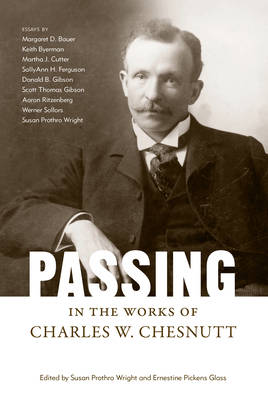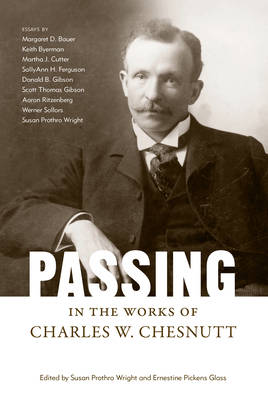
- Afhalen na 1 uur in een winkel met voorraad
- Gratis thuislevering in België vanaf € 30
- Ruim aanbod met 7 miljoen producten
- Afhalen na 1 uur in een winkel met voorraad
- Gratis thuislevering in België vanaf € 30
- Ruim aanbod met 7 miljoen producten
Zoeken
Passing in the Works of Charles W. Chesnutt
€ 50,95
+ 101 punten
Omschrijving
An exploration of a great American writer's abiding concern with the color line Essays by Margaret D. Bauer, Keith Byerman, Martha J. Cutter, SallyAnn H. Ferguson, Donald B. Gibson, Scott Thomas Gibson, Aaron Ritzenberg, Werner Sollors, and Susan Prothro Wright Passing in the Works of Charles W. Chesnutt is a collection that reevaluates Chesnutt's deft manipulation of the "passing" theme to expand understanding of the author's fiction and nonfiction. Nine contributors apply a variety of theories--including intertextual, signifying/discourse analysis, narratological, formal, psychoanalytical, new historical, reader response, and performative frameworks--to add richness to readings of Chesnutt's works. Together the essays provide convincing evidence that "passing" is an intricate, essential part of Chesnutt's writing, and that it appears in all the genres he wielded: journal entries, speeches, essays, and short and long fiction. The essays engage with each other to display the continuum in Chesnutt's thinking as he began his writing career and established his sense of social activism, as evidenced in his early journal entries. Collectively, the essays follow Chesnutt's works as he proceeded through the Jim Crow era, honing his ability to manipulate his mostly white audience through the astute, though apparently self-effacing, narrator, Uncle Julius, of his popular conjure tales. Chesnutt's ability to subvert audience expectations is equally noticeable in the subtle irony of his short stories. Several of the collection's essays address Chesnutt's novels, including Paul Marchand, F.M.C., Mandy Oxendine, The House Behind the Cedars, and Evelyn's Husband. The volume opens up new paths of inquiry into a major African American writer's oeuvre.
Specificaties
Betrokkenen
- Uitgeverij:
Inhoud
- Aantal bladzijden:
- 148
- Taal:
- Engels
- Reeks:
Eigenschappen
- Productcode (EAN):
- 9781617033247
- Verschijningsdatum:
- 24/04/2012
- Uitvoering:
- Paperback
- Formaat:
- Trade paperback (VS)
- Afmetingen:
- 152 mm x 229 mm
- Gewicht:
- 226 g

Alleen bij Standaard Boekhandel
+ 101 punten op je klantenkaart van Standaard Boekhandel
Beoordelingen
We publiceren alleen reviews die voldoen aan de voorwaarden voor reviews. Bekijk onze voorwaarden voor reviews.







